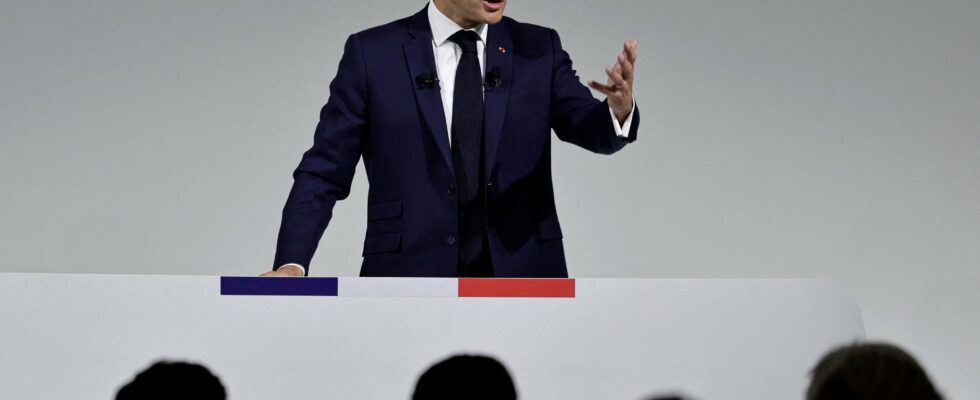Who, in the macronie, was not stunned by Emmanuel Macron’s declaration? It is 9 p.m., Sunday June 9, when the President of the Republic prepares to speak. A declaration like a cleaver: “After having carried out the consultations provided for in article 12 of our Constitution, I have decided to give you back the choice of our parliamentary future by vote. I am therefore dissolving the National Assembly this evening.”
Everyone knew, in a context of relative majority, their precarious functions; but learning of the dissolution, and therefore the end of their mandate on television, all the same… “It is symptomatic of the consideration he has of his majority: he does not care. If he had been in front of me, I would have torn his eyes out of his head,” seethes a parliamentarian from the majority.
The decision to dissolve was welcomed by two thirds of French people, argued the Head of State during his press conference on Wednesday June 12. “Authoritarianism” and “solitary exercise of power”, respond some indignant people. “Macron tells himself that only he knows, that he does what he thinks. And that if we are not happy, we just have to look elsewhere,” storms a Renaissance MP.
“I was hoping that we wouldn’t give the keys to the truck to the RN right away”
It is a feeling of betrayal which is affecting part of the majority today. That, also, of not “being listened to”, deplores Patrick Vignal. Finally, have they ever been? “I am not sure that he did everything to be liked by the deputies,” continues the elected official from Hérault. No secret: “Feelings are not the style of the house,” jokes another. The link had already weakened considerably since the start of this legislature, while some deplore the abusive use of 49.3. The divide at its peak.
Not surprised by the method, the Macronist deputies still judge the timing of the decision to be inappropriate: “When we are a little rational in politics, it is not when we are at the bottom of the bucket that we are going to ask people to vote for us, the ‘Macronian disruption’, I’m getting over it,” admits a doubter. Another, defeatist: “I was hoping that we wouldn’t give the keys to the truck to the RN right away.”
But the master of the clocks has moved the hands forward: we must now beat the countryside. Put in parentheses, with death in the soul, the few works in progress. Don’t talk to Olivier Falorni: “A tough blow to take.” The commitment of a lifetime, the law on the end of life, buried a few days before its adoption by the national representation. “It is all the more regrettable as the debates were well held, they restored the image of the Assembly,” he confides. He will return to the campaign: Jordan Bardella came well ahead in his department, Charente-Maritime. Around ten parliamentarians, for the moment, say, for their part, that they will not run again. Among them, Modem and Renaissance deputies Jean-Louis Bourlanges and Joël Giraud. “This world is no longer mine,” assured the second.
“It’s not a moment where everyone rushes: some don’t really want to go back, assures a minister. Others have difficulty admitting that they will not die on stage.” Some in the government, without a constituency, hesitate: participate in the fight, yes. But where ? “We, members of the government, have a target on our backs.” A parliamentarian tackles: “Future ministers must be elected. This is Verdun! We can’t have people hiding out waiting for others to win battles for them.” Even if it means being cannon fodder, there is no question of facing the situation alone.
“It could end in a situation of cohabitation with our own majority”
Like a survival instinct. At a group meeting on Tuesday June 11, many of them asked Prime Minister Gabriel Attal to fully commit to these legislative elections in place of Emmanuel Macron. Because many of them were strangled after the exit of the head of state, who assured that he wanted to make “three interventions per week until the legislative elections” – the Elysée has backpedaled since. So many assure it, under the seal of anonymity – inauguration in progress obliges: during the campaign, they will distance themselves from the President of the Republic.
“I have no dilemma, I will not put Macron’s head on. I did it in 2022: people always snatched his photo from the panels. He provokes early elections which are no longer linked to the presidential, so if I am elected, it is on my name and my work”, confides a deputy. Others will happily display the figure of the Prime Minister, to their less repulsive taste. One MP is even considering isolating the mention of “Renaissance” on his campaign leaflets: “I am going to sell a man, not a political party”. 2017 is far away.
What will hold the majority from now on, if not the conviction that the president despises them? Recently, a minister worried about this: “All this could end in a situation of cohabitation with our own majority.” Parliamentarians elected on their behalf, self-employed in politics, determined to regain their freedom within the hemicycle. 2017 is far away, yes. “We owe our election to Macron. But do we owe him everything?” asks Patrick Vignal. Ludovic Mendes, deputy for Moselle, assures him: “We will be less tender with the government.” That, if all goes well.
.
